Youth athletes often grapple with mental health challenges such as anxiety, depression, and burnout due to competitive pressures and high expectations. Effective strategies include fostering open communication, promoting a growth mindset, and engaging community support. Access to mental health resources, peer mentorship, and workshops can empower young athletes and their families. Prioritising mental well-being alongside athletic performance creates a healthier environment for youth in sports.
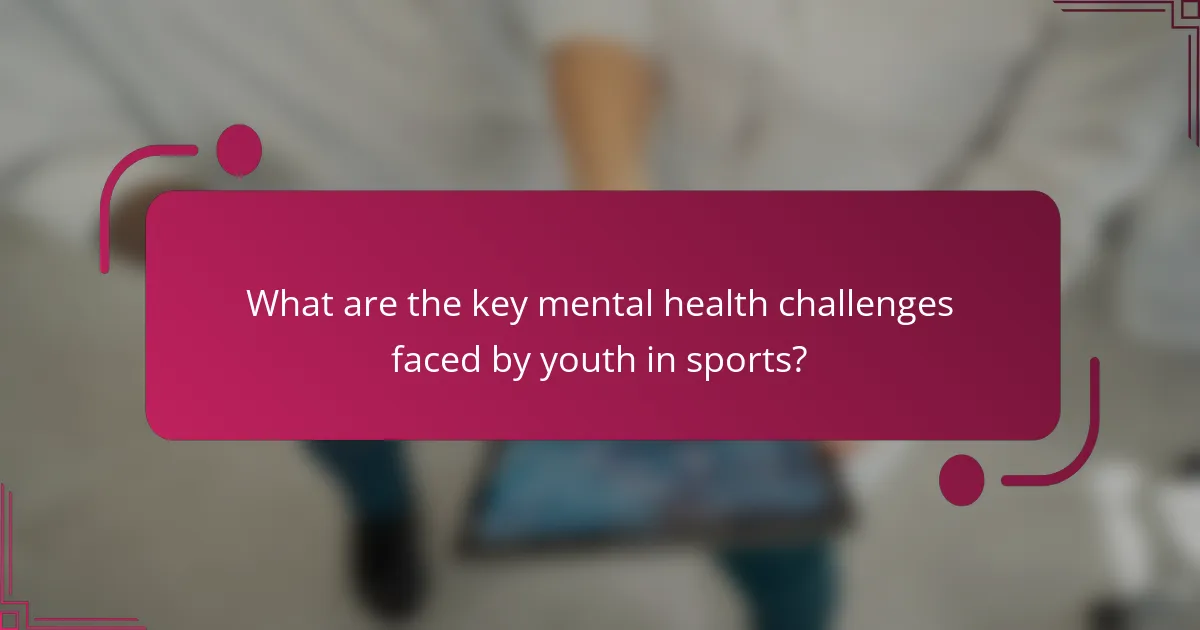
What are the key mental health challenges faced by youth in sports?
Youth in sports face key mental health challenges, including anxiety, depression, and burnout. These issues stem from high expectations, competitive pressures, and lack of support. According to research, nearly 30% of young athletes experience significant mental health concerns. Addressing these challenges requires effective strategies, such as promoting open communication, providing mental health resources, and fostering community engagement. Schools and sports organisations should prioritise mental well-being alongside athletic performance to create a supportive environment for youth athletes.
How do performance pressures impact mental well-being?
Performance pressures can significantly harm mental well-being by increasing anxiety and stress levels among youth athletes. High expectations from coaches and parents can lead to burnout and decreased self-esteem. Research indicates that over 50% of young athletes experience mental health issues related to performance demands. Addressing these pressures through supportive environments and open communication is crucial for promoting psychological resilience. Engaging in mental health resources and community support can mitigate these negative impacts, fostering a healthier sports experience.
What role does social media play in youth athletes’ mental health?
Social media significantly impacts youth athletes’ mental health by providing support, connection, and resources. It fosters community engagement, allowing athletes to share experiences and seek advice. Positive interactions can enhance self-esteem, while negative feedback may lead to anxiety and stress. Strategies to mitigate risks include promoting healthy online behaviour and encouraging open conversations about mental health.
How can online interactions affect self-esteem?
Online interactions can negatively impact self-esteem by fostering comparison and cyberbullying. Youth engaged in sports may experience heightened pressure from social media, leading to feelings of inadequacy. Studies show that 70% of young athletes report anxiety related to online feedback. Positive online engagement can enhance self-esteem through community support and encouragement. Strategies to mitigate negative effects include promoting digital literacy and encouraging healthy online habits.
What are the risks of cyberbullying among young athletes?
Cyberbullying poses significant risks to young athletes’ mental health, leading to anxiety, depression, and decreased self-esteem. These athletes may experience isolation, impacting their performance and enjoyment of sports. Research indicates that 15% of young athletes report being bullied online, with 50% feeling unsafe due to cyberbullying incidents. Effective mental health support strategies include promoting open communication, fostering supportive environments, and providing access to counselling resources. Community engagement plays a vital role in creating awareness and prevention initiatives that empower athletes to speak out against cyberbullying.
How does the culture of competitiveness influence mental health?
The culture of competitiveness can negatively impact youth mental health by increasing stress and anxiety levels. High expectations and pressure to perform often lead to burnout and feelings of inadequacy. Research indicates that 70% of young athletes experience anxiety related to their performance. This environment can discourage participation and reduce enjoyment in sports. Mental health support strategies, such as fostering a growth mindset and promoting open communication, are essential to mitigate these effects. Engaging community resources and supportive coaching can create a healthier competitive atmosphere.
What are the signs of mental health issues in young athletes?
Young athletes may show signs of mental health issues through changes in behaviour, mood, and performance. Common indicators include decreased motivation, increased anxiety, withdrawal from teammates, and changes in eating or sleeping patterns. Monitoring these signs helps in early intervention and support. Engaging coaches and parents in recognising these symptoms is crucial for timely mental health resources.

What universal strategies can support mental health in youth sports?
Creating a supportive environment is essential for enhancing mental health in youth sports. Strategies include fostering open communication, promoting a growth mindset, and encouraging team bonding activities.
Open communication allows athletes to express feelings and challenges. Coaches should prioritise regular check-ins and create a safe space for sharing. Promoting a growth mindset helps youth view challenges as opportunities for development, reducing performance anxiety.
Team bonding activities, such as group challenges or retreats, strengthen relationships and create a sense of belonging. Research shows that positive social interactions significantly enhance mental well-being in young athletes.
Engaging parents and community members in support initiatives can further reinforce these strategies. Workshops on mental health awareness and resources can empower families to contribute positively to their children’s sports experience.
How can coaches create a supportive environment?
Coaches can create a supportive environment by fostering open communication, promoting inclusivity, and prioritising mental well-being. Establishing trust allows athletes to express concerns and seek help. Implementing regular check-ins and mental health resources enhances support. Community engagement through workshops and partnerships with mental health professionals further strengthens this environment.
What role do parents play in mental health support?
Parents play a crucial role in supporting their children’s mental health in sports. They provide emotional support, encouragement, and a safe environment for open communication. Active involvement helps children develop resilience and coping strategies. Research indicates that parental engagement can improve athletes’ performance and overall well-being. Additionally, parents can advocate for mental health resources within sports communities, ensuring access to professional support when needed.
How can effective communication between parents and coaches be established?
Effective communication between parents and coaches can be established through regular meetings and open dialogue. Consistent updates on the athlete’s progress foster trust and collaboration. Setting clear expectations for both parties enhances understanding. Active listening is crucial; coaches should value parents’ insights while parents should respect coaches’ expertise. Implementing feedback mechanisms allows for ongoing improvement in communication strategies.
What are the benefits of mental health education for athletes?
Mental health education for athletes enhances emotional well-being, resilience, and performance. It provides tools to manage stress, promotes healthy coping strategies, and reduces stigma surrounding mental health issues. Athletes equipped with this knowledge can better navigate the pressures of competition, leading to improved focus and overall mental health. Additionally, such education fosters a supportive community, encouraging athletes to seek help when needed, ultimately enhancing their athletic experience.
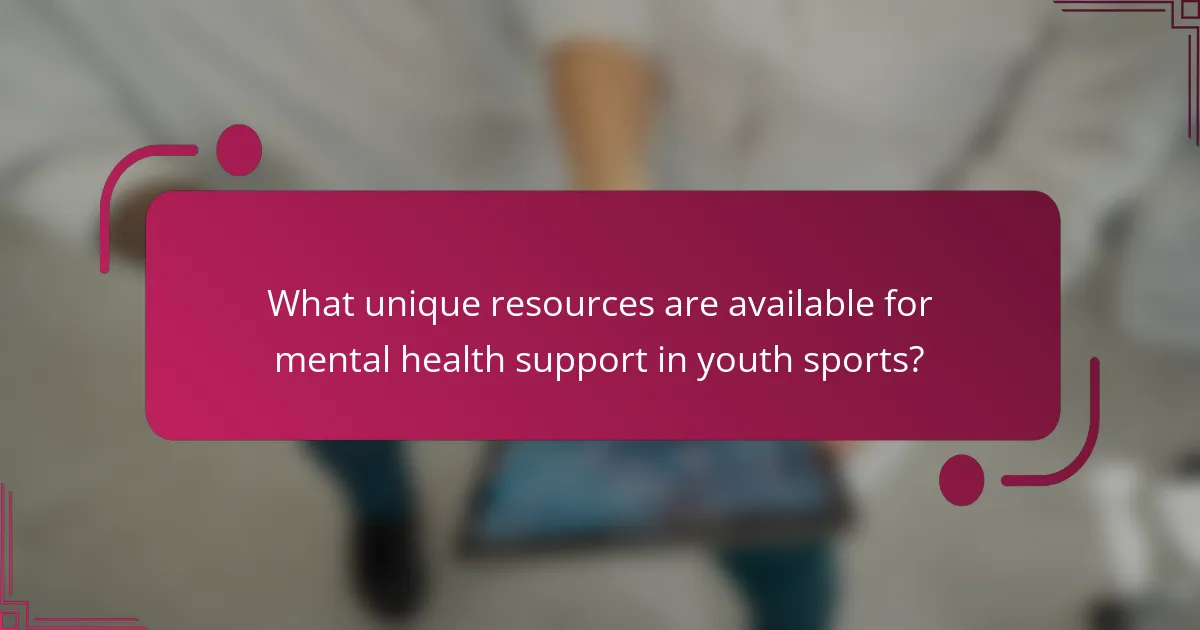
What unique resources are available for mental health support in youth sports?
Youth sports organisations offer unique resources for mental health support, including specialised training programmes for coaches, access to mental health professionals, and peer support groups. These resources aim to create a positive environment that promotes emotional well-being. Programs like the Positive Coaching Alliance provide workshops focused on mental resilience, while community partnerships with local mental health organisations enhance support networks. Additionally, initiatives that foster open communication between athletes, coaches, and parents help address mental health issues early.
What specific programmes focus on mental health for young athletes?
Several programmes focus on mental health for young athletes, including the Positive Coaching Alliance, the National Alliance for Youth Sports, and the Youth Sport Trust. These initiatives provide resources, training, and support to promote mental well-being. They emphasise resilience, emotional skills, and community engagement. For example, the Positive Coaching Alliance offers workshops that help coaches understand mental health issues, fostering a supportive environment for athletes.
How can sports organisations collaborate with mental health professionals?
Sports organisations can collaborate with mental health professionals by integrating mental health programmes into their existing structures. This partnership can enhance athlete well-being through workshops, counselling services, and awareness campaigns. Regular training for coaches on mental health issues is essential, enabling them to identify and support athletes in distress. Additionally, creating a referral system for athletes needing specialised care strengthens the support network. Engaging community resources fosters a holistic approach, promoting mental health as a priority in sports culture.
What are the best practices for integrating mental health services into sports programmes?
Integrating mental health services into sports programmes enhances youth well-being and performance. Best practices include training coaches on mental health awareness, creating supportive environments, and providing access to professional resources. Regular workshops can educate athletes on coping strategies, while collaboration with mental health professionals ensures tailored support. Community engagement through partnerships with local organisations can further strengthen these initiatives.
What role do peer support groups play in promoting mental well-being?
Peer support groups significantly enhance mental well-being among youth in sports by fostering connection and understanding. These groups provide a safe space for sharing experiences, reducing feelings of isolation. They encourage open dialogue about mental health challenges, promoting awareness and acceptance. Research indicates that participation in peer support can lead to improved emotional resilience and coping strategies. Additionally, these groups often facilitate access to resources and professional support, further strengthening youth mental health.
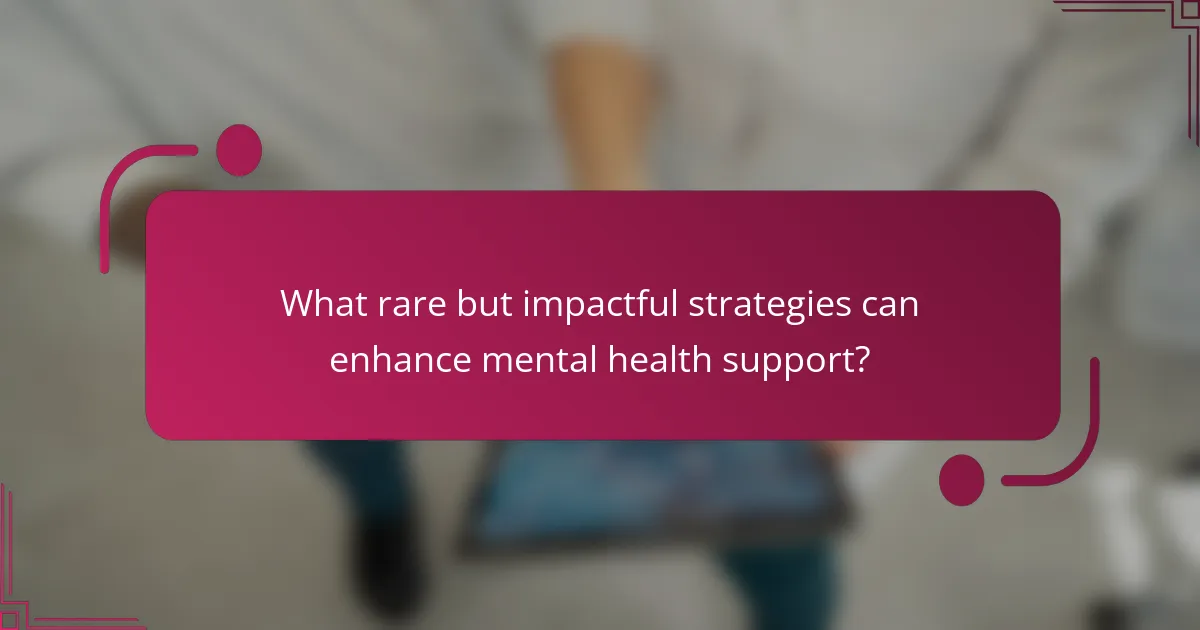
What rare but impactful strategies can enhance mental health support?
Engaging youth in sports with mental health support can be enhanced through unique strategies like peer mentorship, which fosters connection and understanding. Additionally, integrating mindfulness practices into training sessions has shown rare but impactful benefits, improving focus and emotional regulation. Community partnerships with mental health professionals can provide accessible resources and workshops tailored for young athletes. Lastly, promoting open discussions about mental health within teams cultivates a supportive culture, reducing stigma and encouraging help-seeking behaviours.
How can mindfulness and relaxation techniques benefit young athletes?
Mindfulness and relaxation techniques significantly enhance young athletes’ mental health by reducing stress and improving focus. These practices foster emotional resilience, allowing athletes to cope better with competition pressures. Research shows that mindfulness can lead to a 20% increase in performance due to heightened concentration and reduced anxiety. Engaging in such techniques also promotes better sleep quality, which is crucial for recovery and overall well-being. As a result, incorporating mindfulness into training can create a more supportive environment for young athletes.
What innovative technologies are being used for mental health support?
Innovative technologies enhancing mental health support for youth in sports include mobile apps, teletherapy platforms, and AI-driven chatbots. These tools provide accessible resources, real-time support, and personalised interventions. For instance, apps like Headspace offer mindfulness training specifically designed for young athletes. Teletherapy platforms enable remote consultations, removing barriers related to location and stigma. AI chatbots, such as Woebot, engage users in cognitive-behavioural techniques, offering immediate assistance. These technologies improve engagement and provide tailored mental health strategies for youth in sports.
How can art and creative expression serve as therapeutic tools?
Art and creative expression can effectively serve as therapeutic tools for youth in sports by promoting emotional well-being. Engaging in artistic activities allows young athletes to process their feelings, reduce stress, and enhance self-esteem. Creative outlets, such as painting or music, foster a sense of accomplishment and provide a safe space for expression. Research indicates that these activities can lead to improved mental health outcomes, such as reduced anxiety and depression. Additionally, incorporating art into sports programmes can strengthen community bonds, creating supportive environments that prioritise mental health.
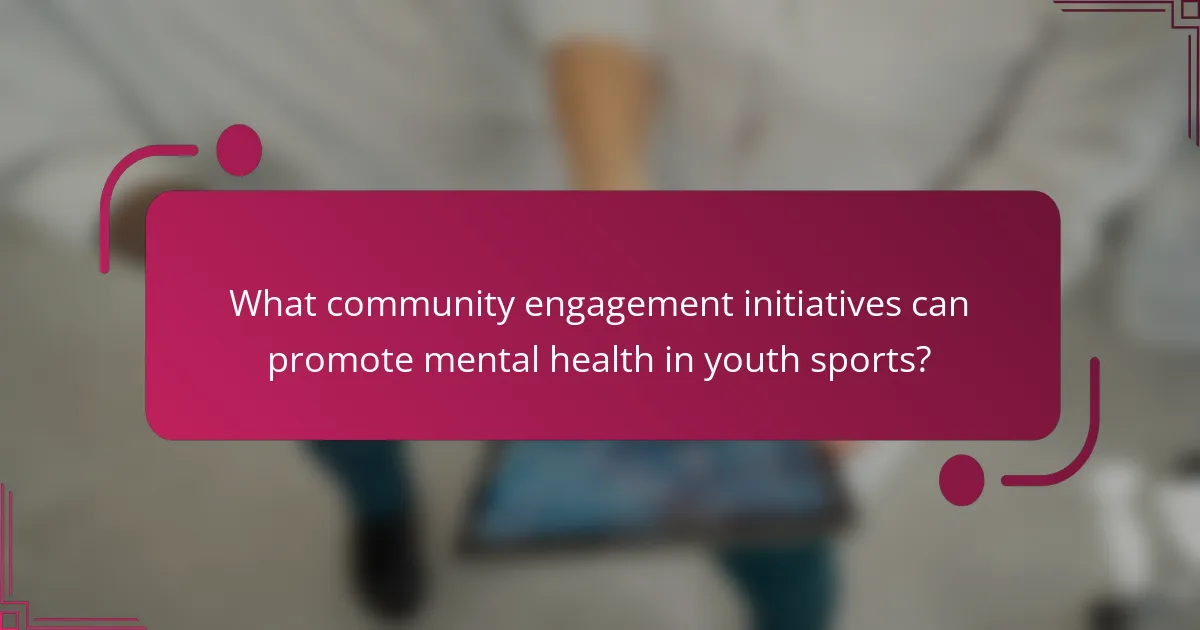
What community engagement initiatives can promote mental health in youth sports?
Community engagement initiatives can significantly enhance mental health support for youth in sports. Programs that foster social connections and provide mental health resources are essential.
1. Workshops on coping strategies teach athletes to manage stress and anxiety effectively.
2. Peer mentoring programmes connect younger athletes with older role models, promoting emotional support.
3. Community events that encourage open discussions about mental health reduce stigma and foster understanding.
4. Collaborations with mental health professionals ensure access to resources and guidance for athletes and families.
5. Social media campaigns raise awareness and provide platforms for youth to share experiences and seek help.
These initiatives create a supportive environment that prioritises mental well-being in youth sports.
How can local sports clubs foster a culture of mental health awareness?
Local sports clubs can foster a culture of mental health awareness by implementing educational programmes, promoting open discussions, and providing access to mental health resources. These initiatives create supportive environments for youth athletes. Educational workshops can teach young athletes about mental health challenges and coping strategies. Regular meetings can encourage sharing experiences, reducing stigma. Collaborating with local mental health professionals can ensure access to resources, enhancing overall well-being. Engaging families in these efforts strengthens community ties and reinforces the importance of mental health in sports.
What partnerships can be formed between schools and mental health organisations?
Schools can form partnerships with mental health organisations to enhance youth mental health support in sports. Collaborations may include joint programmes, workshops, and resource sharing. These partnerships can provide access to mental health professionals, promote awareness, and create safe environments for youth. Engaging parents and coaches in mental health initiatives fosters a supportive community. Effective partnerships lead to improved mental well-being, resilience, and academic performance among student-athletes.
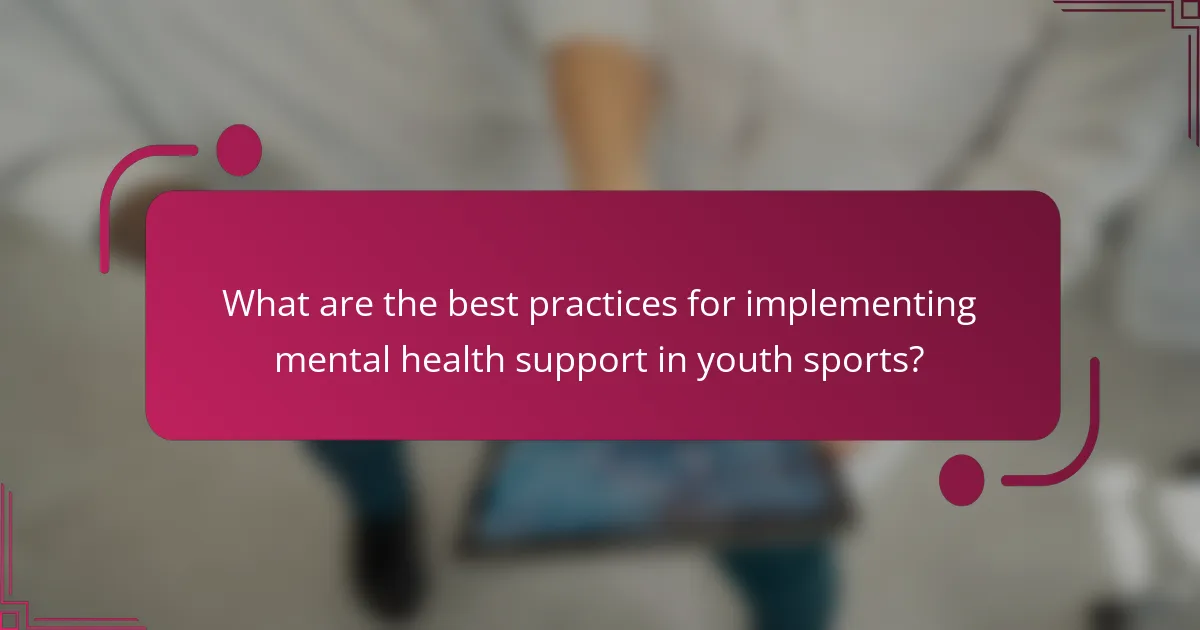
What are the best practices for implementing mental health support in youth sports?
To effectively implement mental health support in youth sports, focus on creating a comprehensive framework that prioritises well-being. Engage trained professionals to provide resources and training for coaches and parents. Establish open communication channels to encourage athletes to express their feelings. Integrate mental health education into training programmes to raise awareness. Foster a supportive community environment that values mental health equally with physical performance.
What common mistakes should be avoided when addressing mental health?
To effectively address mental health, avoid common mistakes such as neglecting communication, failing to create a supportive environment, and overlooking individual needs. Prioritise open dialogue to foster trust. Ensure that mental health resources are accessible and tailored to youth in sports. Recognise signs of distress early to intervene appropriately, promoting a healthier sporting experience.
How can ongoing evaluation improve mental health initiatives in sports?
Ongoing evaluation enhances mental health initiatives in sports by ensuring they adapt to changing needs. Regular assessments identify effective strategies and areas for improvement, fostering a supportive environment. Data-driven insights can guide resource allocation, enhancing community engagement and participation. This proactive approach promotes long-term mental well-being among youth athletes.
What steps can be taken to ensure sustainability of mental health programmes?
To ensure the sustainability of mental health programmes for youth in sports, proactive engagement and support are essential. Establish partnerships with local organisations to provide resources and training for coaches. Implement regular mental health workshops to educate athletes and their families. Create feedback mechanisms to assess programme effectiveness and adapt strategies as needed. Encourage community involvement to foster a supportive environment.